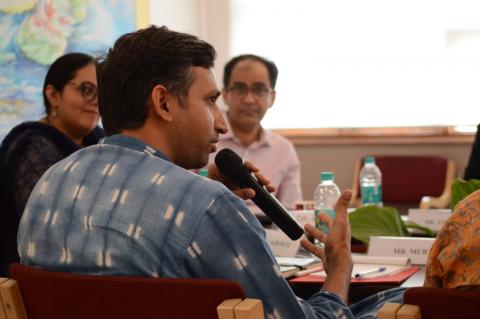
The Quest for Professionalism in Teaching
Every month, I have the opportunity to sit with a group of teachers and explore the possibilities for professional growth. This is an institutional mechanism created by the Delhi government and has been introduced across its schools under the name 'Academic Resource Team.' These meetings are facilitated by the Teacher Development Coordinators (TDCs). Each school in the Delhi government system has a dedicated TDC to support teachers on their professional journeys. The mechanism is well-established, with TDCs receiving assistance from Mentor Teachers, who play a full-time role in mentoring teachers for their professional growth. They are guided by faculties from DIET (District Institute of Education and Training) and SCERT (State Council of Educational Research and Training). STIR Education is a knowledge partner that supports this program through its expertise in the field. Over the past eight years, this program has evolved to create a support system where teachers seeking professional growth can find assistance readily available within their schools.
I recently revisited this idea because many schools have new principals who are unfamiliar with the various programs in place. The recently concluded ART meeting was also an opportunity to orient the newly appointed principals about this crucial professional development program for the teachers in their respective schools. The program, in its approach and objectives, is transformative. However, when I see disinterested faces, with people checking their phones to see when the bell will ring and the meeting will end, always in a hurry to take a picture to document the ART meeting, it leaves me wondering why most teachers are disinterested in programs designed specifically for their professional growth.
Reflecting on this often leads me to a fundamental question: do teachers genuinely want professional growth? Which professional would not want to advance in their career? But then the next question arises: do teachers identify themselves as professionals? Because the system often doesn't recognize teachers as professionals; they are often referred to as 'karmchari,' a term for employees. This is a significant debate in India, with educationists urging the government not to treat teachers as mere 'karmchari.' I cannot find an appropriate English translation for the word 'karmchari'; 'employee' is not an adequate translation. Professional development programs offered in schools are for teachers, not for 'karmchari.' In the government school systems across the country, many teachers choose to remain 'karmchari' within a few years of their employment, while only a few opt to grow as professionals. Choosing to be a 'karmchari' offers security, a sense of belongingness, and freedom from the demanding task of thinking. On the other hand, those who aspire to grow as professionals face numerous challenges in their careers and engage in the most challenging task of all: thinking.
What is the way forward? We are all aware of the challenges our education system faces, and one of the most prominent ones is the growing disinterest of children in the teaching and learning offered in the classroom. This ultimately leads to high dropout rates, which some educational thinkers define as 'push out.' As long as we continue to seek solutions through a top-down approach, I don't believe we will resolve the problems in the classroom. When we have 'karmchari' in the classroom, we expect them to act but not to think; they implement what they are told. However, the challenges our classrooms face require teachers to think, and only professional teachers can do that. Since each classroom is a unique environment, none of our formulas will work. The only formula that will succeed is empowering our teachers to think and find localized solutions. Of course, this is not possible without rekindling their professional journey as educators.
- Log in to post comments
